Hungarian Panorama
When I have been invited to select the Hungarian films for the 5th Verzio, I knew that the task would be rather difficult due to the abundance of Hungarian documentaries. I have decided on - rather subjectively - these ten films that I found particularly precious, interesting and important in the hope that the audience will share my opinion.
Some of the films fascinated me with their visual, poetic beauty like Sándor Mohi's Prayer or Arthúr Bálint's Twins. Other films impressed me with their sensitive and insightful approach to an issue or conflict that seems puzzling at first, but becomes a revelation on screen. The Long Journey, A Village Romance, Ideas and Camps, The Right-Wing Jew, the Disloyal Mother and Mediation all disclose such revelations. I was enthralled not by the pure aestheticism of these fresh, yet often disturbing works, but their pulsating, crude sense of reality. The Hungarian Panorama also includes two films demonstrating a rare delight in recent Hungarian documentary cinema: humor. Butcher's Glory and The Sinking Village are both brilliant representatives of the genre.
Though historical films are less this year, those included in the program are true discoveries: The Imaginary Revolution presents a yet unknown chapter of Romanian history – the story of a surpassed anti-communist revolution. Three Missing Pages on the other hand is one of the most poignant documentaries made about the Holocaust. Péter Forgács's new work I am Von Höfler molds history with the private sphere, and documents with vision. Von Höfler is one of the most brilliant films in Forgács's greatly original and grandiose life-work.
There are countless documentarist approaches: lyrical and investigative, passionate and distant, composed and untamed, interfering and observational – this year's selection reflects this variety. All things considered, there are only two types of documentaries: good and bad ones. I have tried to select those dearest to me belonging to the first category.
György Báron
Curator of the Hungarian Program
The program
The Fidesz Jew, the Mother with No Sense of Nation and Mediation / A fideszes zsidó, a nemzeti érzés nélküli anya és a mediáció
Hajdú Eszter / Hungary / 2008 / 72 min / Hungarian
Can differing political views break up a marriage? The extremes of political friction in Hungary today. 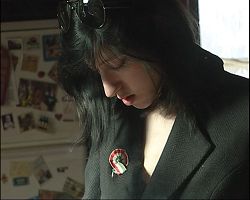
producer: János Vészi
editor: Balázs Féjja
camera: Viktor Németh, Péter Faragó, Dániel Szandtner
sound: Attila Borszéki, Gábor Sípos, Zsolt Ezer, Bob Martini
production info:
Fórum Film Alapítvány
Róna u. 174.
1145 Budapest
Hungary
forumfilm@invitel.hu
tel: +36 1 251 5666 / 608
filmography:
Otthonom, Tarnabod, 2005
http://www.hajdueszter.com/en/My_films/Documentary/The_Fidesz_Jew_and_the_mother_with_no_sense_of_nation_and_mediation.html
Full of Grease / Malaccal teljes
Kovács Kristóf / Hungary / 2008 / 53 min / Hungarian
Enthusiastic villagers set out to represent their village at an international butchers’ competition. A true story with pig killings and a happy end.
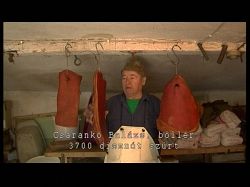
producer: Judit Stalter
editor: Gábor Takács
camera: Dávid Szepesi, Gergõ Somogyvári
sound: Zoltán Vadon
music: Gergõ Barcza
production info:
Judit Stalter
Polluxfilm Kft.
Angyal utca 35.
1094 Budapest
Hungary
+3630 266 8099
filmography:
Willkommen, 2005
I Am von Höfler - Variation on Werther / Von Höfler vagyok - Werther variáció
Forgács Péter / Hungary / 2008 / 160 min / Hungarian
Tibor Von Höfler’s stories and family archival footage open up fascinating fates of the generations of the great Pécs leather manufacturer family. 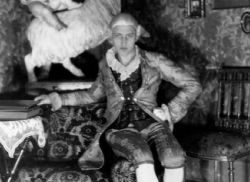
producer: Péter Forgács
editor: Péter Sass
camera: Tibor Höfler
music: Tibor Szemzõ, Gábor Melis
production info:
For-Creation Ltd.
H-1021 Budapest, Mese köz 10.
tel: +36 1 200 7624
info@forgacspeter.hu
selected filmography:
Látom, hogy nézek, 1978 / Avatás, 1980 / Dixi and Pixi, 1983 / Fekete Lyuk, 1984 / Aranykor, 1985 / Spinoza Rückwertz, 1985 / A Bartos család, 1988 / Dusi és Jenõ, 1989 / Vagy-vagy, 1990 / N. úr naplója, 1990 / Fényképezte Dudás László, 1991 / D-film, 1991 / Polgár szótár, 1993 / Egy úrinõ notesza, 1994 / Miközben valahol, 1995 / A semmi országa, 1997 / Az örvény, 1997 / OsztálySORSjegy, 1997 / A maalstrom, 1997 / Csermanek csókja, 1998 / A dunai Exodus, 1998 / Bibó breviárium, 2001 / A püspök kertje, 2002 / Fekete kutya, 2005 / Miss Universe 1929, 2006 / Saját halál, 2007
Ideas and Summer Camps / Koreszmék és táborok
Muhi Klára & Varga Ágota / Hungary / 2007 / 57 min / Hungarian
An unknown virus rears its head in a children's camp in Budapest. Scared to death, the kids later learn that the alarm was a joke played by camp entertainers. Extreme fun and moral ethics. 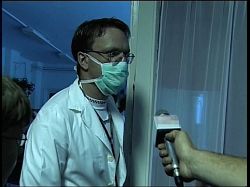
producer: András Muhi
editor: Gábor Takács
camera: György Pálos, Zoltán Lovasi
production info:
Inforg Studio
Kinizsi u. 11
1092 Budapest
Hungary
tel: +36 30 63 933 83
fax: +36 1 219 0961
inforg@inforgstudio.hu
www.inforgstudio.hu
selected filmography:
In memoriam Fábri Zoltán, 2007 / Így készült a Sorstalanság, 2004 / Magyar Filmműhelyek - Inforg Stúdió, 2004 / A Koltai napló 2001-2003, 2003
The Imaginary Revolution / Képzelt forradalom
Zágoni Balázs / Hungary / 2005 / 40 min / Hungarian
The Transylvanian cleric, the Securitate and a revolution that never happened. 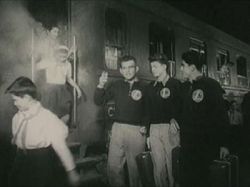
producer: János Vészi
editor: Balázs Zágoni
camera: Zsigmond Erdõs
production info:
Fórum Film Alapítvány
1145 Budapest
Róna u. 174.
Hungary
forumfilm@invitel.hu
tel: +36 1 251 5666/ 608
Last Bus Stop / Hosszú utazás
Böszörményi Zsuzsa & Kai Salminen / Hungary & Finland / 2007 / 52 min / Hungarian
Why would the inhabitants of Szelmenc need a visa to visit their relatives on the other side of the village? A tragic-comic story about geopolitical absurdities and those who suffer from them. 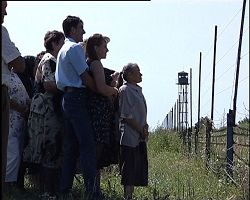
producer: Böszörményi Zsuzsa, Mikael Walhforss
camera: Dobóczy Balázs
editor: Eszlári Beáta
music: Andrej Makarevich, Sonoton
production info:
BGB Film Kft.
Budapest, 1126 Böszörményi út 3/a
bgb@t-online.hu
sales info:
Lombardo Films GmbH
Siegesstr. 23 - D- 80802 München
selected filmography:
Zsuzsa Böszörményi: Mélyen õrzött titkok, 2004 / Vörös Colibri, 1995 / Egyszer volt, hol nem volt, 1991 / Biharsarok, 1990
Prayer / Imádság
Mohi Sándor / Hungary / 2007 / 27 min / Hungarian
The last five years of an elderly farming couple. 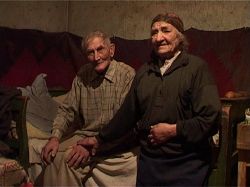
producer: Sándor Buglya
editor: Péter Szalay
camera: Sándor Mohi
sound: Vince Kapcsos
production info:
Dunatáj Alapítvány
1016 Budapest, Mészáros u. 48- 54.
Tel.: 1/ 489 15 29
dunataj@gmail.com
selected filmography:
Se künn, se benn... / Neither Outside Nor Inside…, 2003 / Muszáj / It’s a Must, 2003 / A ház emlékei / The Memories of the House, 2002 / Ahogy az Isten elrendeli... / As God Hath Foreordained, 2001 / Gyöngyökkel gyökereztél / Rooted with Pearls, 1998
The Sinking Village / A süllyedő falu
Szirmai Márton / Hungary / 2007 / 23 min / Hungarian & English
The Hungarian village of Medgyesbodzás is slowly sinking. Is the EU the last hope of the villagers? 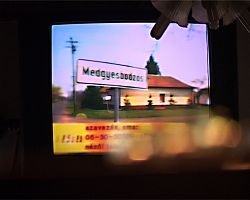
producer: György Pálos
editor: Márton Szirmai
camera: Gergely Pálos
music: Attila Fodor
production info:
Instant Filmek Műhelye
www.instantfilmek.hu
szmarci@gmail.com
Közgáz Vizuális Brigád
Mátyás Király Tér 6/A.
1165 Budapest
Hungary
tel: +36 1 407 3925
www.kvb.hu
selected filmography:
Született lúzer, 2007 / Mecsek Kincse, 2006 / Szalontüdő, 2006 / Becsöngettek, 2005 / Minden nap egy új kaland, 2005
Three Missing Pages / Három hiányzó oldal
Schuster Richárd / Hungary / 2007 / 45 min / Hungarian
Vera parted with her love when he was sent to a forced labor camp. For sixty years she kept silent; now, at the request of her grandson, she tells her story. 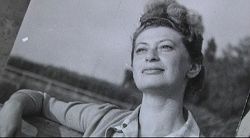
producer: Dr. Tamás Lajos
camera: Ádám Fillenz
editor : Wanda Kiss
sound: Gábor Balázs
production info:
Szupermodern Stúdió Kft.
1021 Budapest
Völgy utca 19.
Tel.: +36 1/ 238 02 01
selected filmography:
Babszi, 2005 / Az öreg gúnya, 2004 / Messziről jött ember, 2002
Twins / Ikrek
Bálint Arthur / Hungary / 2005 / 72 min / Hungarian
Sándor and Lajos live in a quiet Transylvanian village by their own rules, close to nature. The ordinary joys of ordinary people. 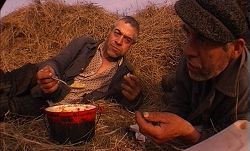
producer: Szederkényi Miklós
Camera: Bálint Arthur
Editor: Simó Csaba
production info:
Dunatáj Alapítvány
1016 Budapest
Mészáros u. 48- 54.
tel: +36 1 489 15 29
dunataj@gmail.com
selected filmography:
Kisvárosi Mozi, 2007 / Nők a hinta körül, 2007 / Piine = kenyér, 2007 / Poros öltöny, 2007
A Village Romance / Falusi románc
Bódis Kriszta / Hungary / 2006 / 50 min / Hungarian
Bitter-sweet love story between a middle-aged lesbian and a married Roma woman in a remote Hungarian village.
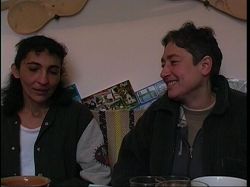
producer: András Muhi
editor: László Gyimesi
camera: Mária Takács
sound: Orsolya Lacházi
music: Cserepes, Palya Bea Quintet
production info:
Inforg Studio
Kinizsi u. 11
1092 Budapest
Hungary
tel: +36 30 63 933 83
fax: +36 1 219 0961
inforg@inforgstudio.hu
www.inforgstudio.hu
selected filmography:
Báriséj (Nagylány), 2007 / Amari kris - Az eskü törvénye, 2004 / Rabszolgavásár, 2002